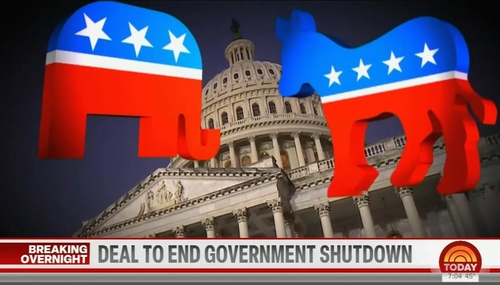 On Tuesday's New Day, CNN's Chris Cuomo bizarrely zeroed in on presidential contender Ben Carson's religious beliefs as a possible factor that could hurt his chances among the Republican base: "Is it fair criticism to look at Dr. Carson's faith being Seventh Day Adventist, in terms of how it may oppose evangelicals? There is a belief within the strictest tenets of Seventh Day Adventist belief that evangelicals will be going to hell. There are other extreme propositions in that faith, and in many." [video below]
On Tuesday's New Day, CNN's Chris Cuomo bizarrely zeroed in on presidential contender Ben Carson's religious beliefs as a possible factor that could hurt his chances among the Republican base: "Is it fair criticism to look at Dr. Carson's faith being Seventh Day Adventist, in terms of how it may oppose evangelicals? There is a belief within the strictest tenets of Seventh Day Adventist belief that evangelicals will be going to hell. There are other extreme propositions in that faith, and in many." [video below]
Cuomo interviewed the former neurosurgeon's business manager, Armstrong Williams, early in the 7 am Eastern hour of the morning newscast. The anchor noted that Dr. Carson placed first in the latest CBS News poll, and underlined that "with this elevation of status will come elevation in scrutiny." He added that "evangelicals in Iowa may be embracing Dr. Carson because of his faith." He continued with his question about the "strictest tenets" and "extreme propositions" in Seventh Day Adventism. Williams replied, in part, that Carson "does not embrace that."
The CNN journalist has a history of targeting Dr. Carson. Almost a month earlier, on the September 28, 2015 edition of New Day, Cuomo asserted that the Republican is "pandering to a xenophobic religious minority in this country that's anti-Islam." Earlier in the year, he conducted three confrontational interviews of the candidate in February, March, and June of 2015.
Cuomo's co-anchor, Alisyn Camerota, also went after Carson during a September 21, 2015 interview of Williams. Camerota quoted Article VI of the U.S. Constitution regarding religious tests for public office, and asserted that "Dr. Carson's belief system violates that part of the Constitution."
The transcript of the relevant portion of Chris Cuomo's interview of Armstrong Williams on the October 27, 2015 edition of CNN's New Day, including the context of Cuomo's question on Seventh Day Adventism:
CHRIS CUOMO: I understand from people who are close to Dr. Ben Carson that he sees volume as weakness in people — that when asked to explain why his demeanor is more quiet; that, maybe, he has to pump it up — you know, to show that he has the energy — he says, no, no, no. Strength is often being measured in tone — that when someone's loud, the louder they have to make the point, the less they believe it. Is that true?
ARMSTRONG WILLIAMS, BEN CARSON'S BUSINESS MANAGER: Well, you know, listen, Chris: I think this is something you and I can agree on. I mean, when you have been a pediatric neurosurgeon for over 30 years, and your calmness and your gentleness and your listening saves lives, or prevents people from life-long injuries — that's just who he is. That's his character. And time, circumstances, and this campaign trail reveals your character. That's who he is. He can't be anybody else but that calm, gentle, low voice, but it doesn't mean that he's weak. He has the common strength; he has the discipline; and he has the judgment to understand that sometimes, you don't have to be the loudest person in the room to be heard.
CUOMO: So there's a CBS poll that just dropped while you were answering that question — 26-22, Carson is up everywhere, not just in Iowa. Now, with this elevation of status will come elevation in scrutiny. Two points of pushback for you to respond to: one, evangelicals in Iowa may be embracing Dr. Carson because of his faith. Is it fair criticism to look at Dr. Carson's faith being Seventh Day Adventist, in terms of how it may oppose evangelicals? There is a belief within the strictest tenets of Seventh Day Adventist belief that evangelicals will be going to hell. There are other extreme propositions in that faith, and in many. Is that a fair line of criticism?
WILLIAMS: You know, Dr. Carson's interview with Malika Henderson, one of your very own here at CNN — and obviously, he does not embrace that. CNN has done that story.
You know what? People — when people think about — we get so caught up in these denominations — that one is better than the other — but what matters is a person's moral compass. What matters is how they treat the least among us. What matters is their character. Are they honest? Are they trustworthy? And if you look at the polls, Dr. Carson's favorability ratings are off the charts, Chris. They like him. They believe him.
And so, this is what faith should be about. It's not whether you're better than someone else. It's about whether you embrace the tenants of being a good human being; being a decent human being; and whether your word means anything; and whether you have the humility that if you make a mistake — if you misstate something — that you're willing to apologize. And whether you're willing to surround yourself with counselors who know more about (sic) you on foreign policy; or maybe, about the economy, so you can grow together — because like Dr. Carson says, in a multitude of counselors, you will find wisdom; you will find the answers to move this country forward.




